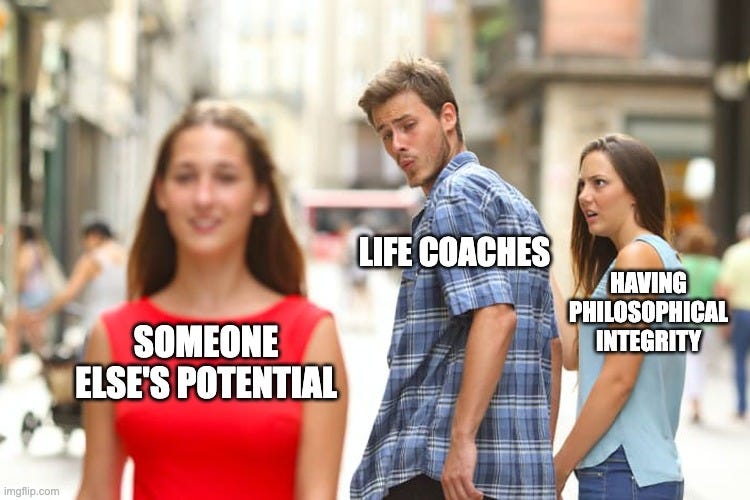A common fallacy committed by life coaches, self-help gurus, and multi-level marketers—though not explicitly stated, yet indirectly expressed—goes like this:
Premise 1: You are not living up to your “potential” (usually with a focus on financial potential).
Premise 2: Doing [what the life coach recommends, which includes hiring them as a coach] will allow you to live up to your potential.
Conclusion: Therefore, you must do [what the life coach recommends], or you will not live up to your potential.
The above argument is a form of the false dilemma fallacy. A false dilemma occurs when an argument asserts that you must follow the life coach’s advice as the only way to reach your “potential,” ignoring other possible pathways. I put the word “potential” in quotes because it’s such a philosophically naughty word—too subjective and vague, making it easy for life coaches to exploit when selling to prospective clients.
The life coach fallacy follows the “problem-agitate-solution” copywriting formula—first emphasizing a problem or “pain point” (“You are underpotentializing in finances and life itself”), then agitating it (“Look at the wealth and life you’re foolishly missing out on!”), and finally offering the solution (“ME!”—the life coach and their success formula). While such marketing is highly effective, it often relies on devilishly fallacious arguments.
This fallacy is on my mind because I recently jumped on a call with someone new to the coaching world. They were in their zealous phase, eager to try the fallacy out on me.
When, in so many words, they hit me with the first premise, I was annoyed. I’m not going to claim that I’m fully living up to my potential—financial or otherwise—and while I was open to their advice, I wasn’t impressed by how predictably forceful they were in delivering it.
In truth, I was more annoyed at myself because I hadn’t yet worked on immunizing myself against the power of this fallacy—and it is a powerful one. The first premise hits hard and can throw someone off guard: “Yeah, fuck, they’re right. I’m not living up to my potential in ‘X,’ and I could be.”
Once you’re in that reflective and open state, and they sense a possible pain point—boom, you get speedrun by the life coach. This is where they pull a quick bait-and-switch: that “could be” turns into a “should be.”
I think the best way to defend against this fallacy is not by challenging the false dilemma aspect, but by directly questioning the silent argument embedded in the first premise. It goes something like this:
Premise 1: You should be living up to your potential (the moralizing “hidden premise” a life coach smuggles in).
Premise 2: You are not living up to your potential.
Conclusion: Therefore, you are failing at life (or something equally agitating).
The above argument contains a non sequitur fallacy—a fallacy in which the conclusion does not logically follow from the premises. In this case, just because someone is not currently living up to their potential—even if they “should” be (a premise that can also be challenged)—does not mean they are failing at life.
For each person, there will be a wise and bespoke order of operations for pursuing certain values in life. Maintaining integrity and ensuring its foundation is unshakable is more critical than reaching one’s “potential,” which, in practice, often means rushing forward with an unexamined, shame-fueled drive to attain success markers that confer societal status.
You might be asking yourself: “Do I really need to be this logically geeky, learning all these fallacies?” No, you do not need to engage in fallacy spotting (except for these three). But yes, this is how I think when working through tricky and sneaky communication patterns from others.
When people speak (or sell)—even if they are not trained in informal logic—they are always using the language of reason, with varying degrees of validity, soundness, and cogency, and with more or fewer fallacious arguments. It’s important to be sharp in one’s reasoning—within reason—as it is the lifeblood of philosophy. As I like to say, one false premise can misguide a life.
Overall, I am grateful for having been hit with this fallacy in the way that I was. It allowed me to become fully guarded against it, in a way that will hopefully help others guard against it as well.
And as I’ll detail in an upcoming entry, it inspired me to go directly into the belly of the beast—deep within the “coach-industrial complex,” where coaches coach aspiring coaches on how to be a coach—to confront this fallacy head-on…
If you have any questions, insights, feedback, or criticism on this entry or more generally, message me below (I read and respond on Saturdays) …





